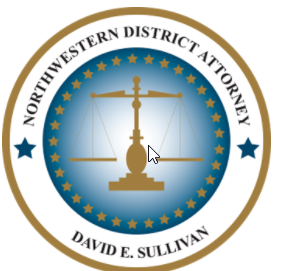DA Sullivan calls bid to strengthen high-speed chase law “long overdue”

The Northwestern District Attorney’s Office is urging lawmakers to approve a measure that would strengthen the penalties for motorists who flee police at high speeds when signaled to stop on roadways.
Northwestern District Attorney David E. Sullivan has submitted written testimony to the Joint Committee on Transportation in support of the legislation; Northwestern First Assistant District Attorney Steven Gagne will testify Monday at a public hearing being held by the committee regarding the proposal which would make such crimes felonies punishable by up to five years in prison and a fine of up to $2,500. Currently under Massachusetts law, fleeing police is a misdemeanor punishable by a $100 fine.
Introduced by State Rep. Daniel Carey, D-Easthampton, and supported by State Rep. Natalie Blais, D-Sunderland, among others, House bill 3420, “An Act Relative to High Speed Pursuits” would bring Massachusetts in line with every other New England State in making fleeing police after being signaled to stop a serious crime.
In his written testimony, DA Sullivan called the stricter penalties “long overdue and necessary.” It will help “create safer roadways and prevent deaths and serious injuries caused by motorists who engaged in high speed pursuits,” he wrote.
According to ADA Gagne, many states, including all other New England states, have enhanced penalties for people who drive dangerously when trying to elude the police.
“In this regard, Massachusetts is an outlier. H3420 fixes that,” he said.
He notes that the legislation in no way encourages police to engage in high-speed pursuits and that many departments already curtail the circumstances under which officers can pursue drivers who flee at high speeds. The statute would provide a serious penalty for the serious threat to public safety created by these drivers.
The Joint Committee on Transportation will be holding a public hearing on the proposed legislation at 3 p.m. Monday. More information on the hearing can be found at this link.
--END--
Criminal charges are based on probable cause to believe a person has committed a crime.
All defendants are presumed innocent unless proven guilty in court.

